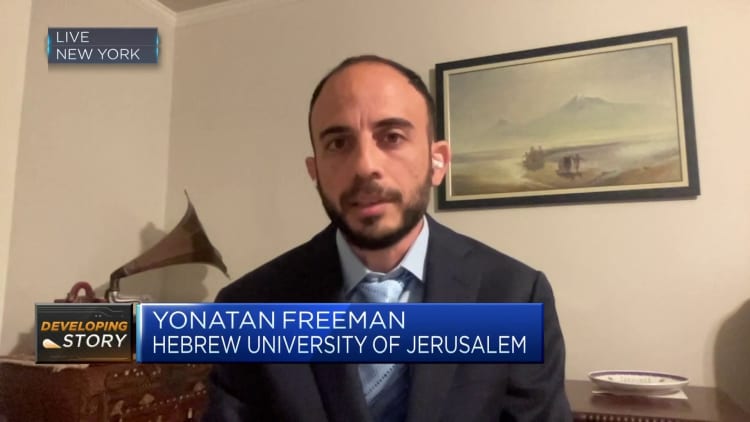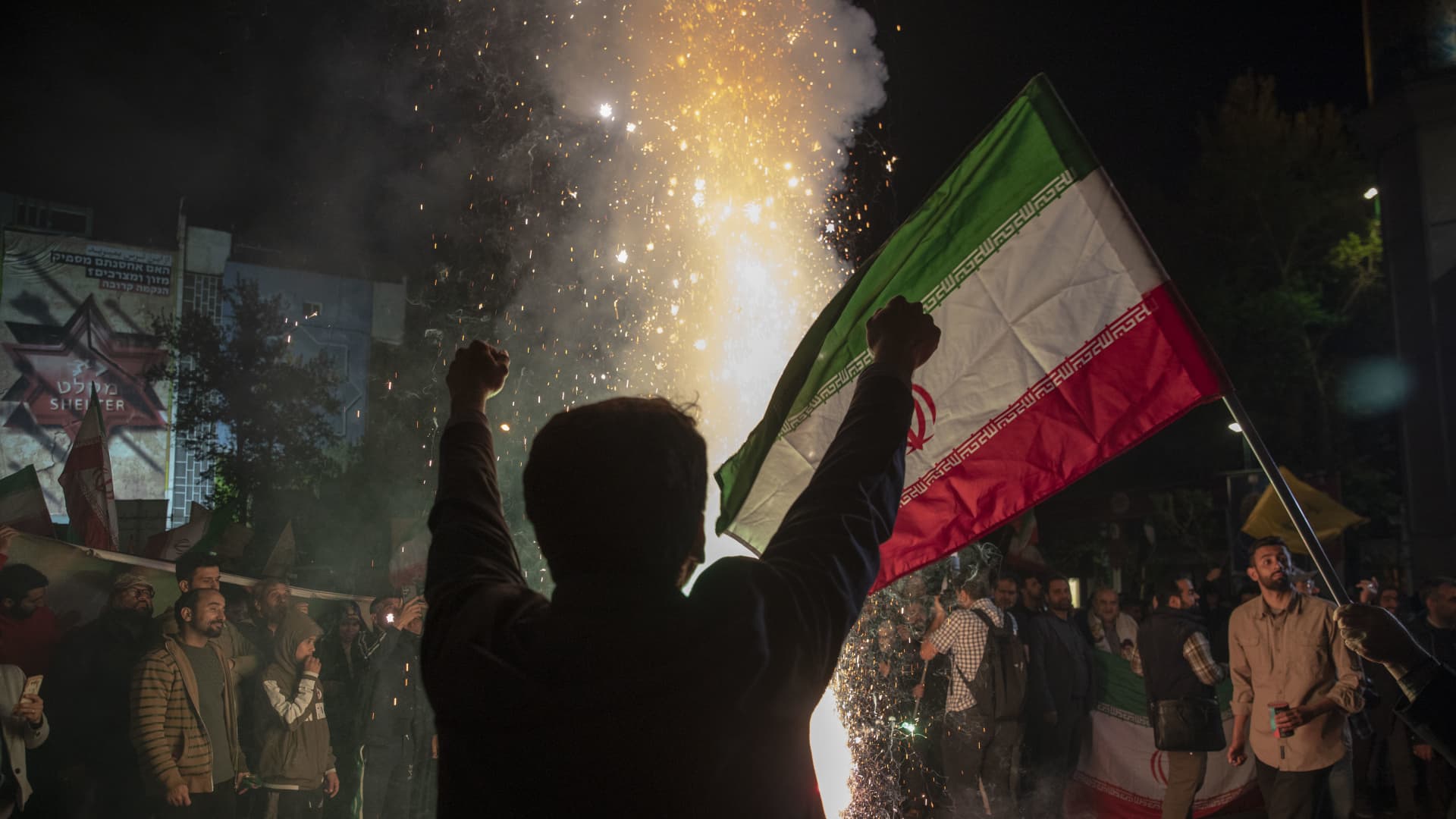People gather in support of the Islamic Revolutionary Guard Corps’ attack on Israel on April 14, 2024 in Tehran, Iran. Late on Saturday, Iran launched a direct attack at Israel, about two weeks following the Israeli attack on the Iranian consulate in Syria.
Majid Saeedi | Getty Images News | Getty Images
World leaders have called for calm in the aftermath of Iran’s large-scale air attacks on Israel on Saturday, with many expressing deep concern over the prospect of a broader regional conflict.
Iran’s strikes, which Israel’s defense forces say involved more than 300 drones and missiles against military targets in Israel, has ratcheted up fears of a spillover conflict in a region already grappling with the ongoing war in the Gaza Strip.
The assault only resulted in limited damage, with Israel’s military saying its Iron Dome defense system intercepted 99% of the drones and missiles launched by Iran.
Iran says its air offensive came in response to a suspected Israeli strike on its embassy compound in the Syrian capital of Damascus earlier this month.
“We will not be able to comment on the claims regarding a strike in Damascus,” an Israeli foreign ministry spokesperson told CNBC on Sunday.
Ahead of a war cabinet meeting on Monday, Israel has pledged to “exact a price” from Iran in response to the Saturday attack. Analysts have said they are unsure of the exact timing and extent of such a retaliation.
U.S. President Joe Biden on Saturday said that he condemned “in the strongest possible terms” Iran’s unprecedented air attack against military facilities in Israel.
Biden added that the U.S. “will remain vigilant to all threats and will not hesitate to take all necessary action to protect our people.”
His comments come as some top U.S. officials reportedly worry that Israel may soon respond to Iran’s drone and missile attacks and trigger a wider regional conflict, according to NBC News.
Biden, who affirmed the White House’s “ironclad” commitment to Israel’s security once again over the weekend, has privately expressed concern that Israel’s Prime Minister Benjamin Netanyahu is trying to drag the U.S. into a broader conflict, NBC News reported Sunday, citing three unnamed people familiar with the matter.
CNBC could not independently verify the report.
‘No one wants to see more bloodshed’
European leaders castigated Iran’s attack against Israel and vowed to work to de-escalate the situation.
“I condemn in the strongest terms the unprecedented attack launched by Iran against Israel, which threatens to destabilize the region,” French President Emmanuel Macron said on Sunday on social media platform X.
“France is working on de-escalation with its partners and calls for restraint.”
Britain’s Prime Minister Rishi Sunak records a statement about the Iranian attacks on Israel overnight, at 10 Downing Street on April 14, 2024 in London, England.
Wpa Pool | Getty Images News | Getty Images
German Foreign Minister Annalena Baerbock on Saturday said that Germany “strongly” condemned the attack and warned that it could “plunge an entire region into chaos.”
“Iran and its proxies must stop this immediately. Israel has our full solidarity at this time,” Baerbock said via X, according to an NBC translation.
U.K. Prime Minister Rishi Sunak said Saturday that he condemned “in the strongest terms” the “reckless” Iranian attack against Israel, adding that the country would “continue to stand up” for Israel’s security.
“Iran has once again demonstrated that it is intent on sowing chaos in its own backyard,” Sunak said in a statement.
“Alongside our allies, we are urgently working to stabilise the situation and prevent further escalation. No one wants to see more bloodshed,” he added.
France and the U.K. intercepted some of Iran’s strikes on Israel on Saturday.
‘Utmost levels of restraint’
In the Middle East and North Africa region, Saudi Arabia’s Foreign Ministry expressed “deep concern” regarding the developments of military escalation in the region “and the seriousness of its repercussions.”
In a statement published via X on Sunday and translated by NBC News, the ministry called on all parties “to exercise the utmost levels of restraint” and urged the United Nations Security Council to prevent the escalation of a crisis that would have “serious consequences if it expands.”

Egypt said it expressed “deep concern” regarding the Iranian offensive and called for the “utmost degree of restraint to spare the region and its peoples from further factors of instability and tension.”
“Egypt considers that the dangerous escalation that the Iranian/Israeli arena is currently witnessing is nothing but a direct result of what Egypt has repeatedly warned about, about the dangers of expanding the conflict in the region as a result of the Israeli war on the Gaza Strip, and the provocative military actions being practiced in the region,” the ministry said on X, according to a translation.
‘Latest spillover of the Gaza conflict’
In Asia, a foreign ministry spokesperson for China said Sunday that Beijing expressed “deep concern” over the escalation of tensions in the region and called on relevant parties “to exercise calm and restraint.”
“The ongoing situation is the latest spillover of the Gaza conflict,” the spokesperson said in response to a question about Iran’s strikes.
“China calls on the international community, especially countries with influence, to play a constructive role for the peace and stability of the region.”
Japanese Foreign Minister Yoko Kamikawa speaks during a press conference as she announced to resume funding to the UN agency for refugees in Palestine, or the UNRWA, Kyodo news agency reported, in Tokyo, Japan on April 2, 2024.
Anadolu | Anadolu | Getty Images
Japan’s Foreign Minister Yoko Kamikawa said the country was “deeply concerned about the attacks, which further deteriorate the current situation in the Middle East, and strongly condemns such an escalation.”
“Japan has been strongly urging the parties concerned to calm down the situation as peace and stability in the Middle East is extremely important for Japan as well,” Kamikawa said in a statement on Sunday.
‘Prelude to World War III’
In South America, Colombia’s President Gustavo Petro called on the United Nations to “meet urgently” and “immediately commit to peace.”
“It was predictable; we’re now in the prelude to World War III precisely when humanity should rebuild its economy towards the rapid goal of decarbonization,” Petro said.
“The support of the U.S., in practice, for a genocide, has ignited the world. Everyone knows how wars start, no one knows how they end.”
Gustavo Petro, Colombia’s president, during a meeting with Nicolas Maduro, Venezuela’s president, not pictured, at Miraflores Palace in Caracas, Venezuela, on Tuesday, April 9, 2024.
Bloomberg | Bloomberg | Getty Images
Argentina’s President Javier Milei said his office expressed its “solidarity and unwavering commitment” to Israel following the attacks by Iran.
“The Republic of Argentina recognizes the right of State-Nations to defend themselves and strongly supports the State of Israel in the defense of its sovereignty, in particular against regimes that promote terror and seek the destruction of western civilization,” Milei said.







